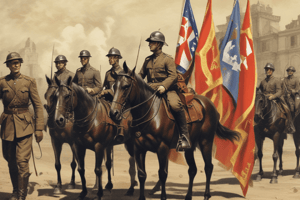Podcast
Questions and Answers
What was the initial approach of major powers, including France, Britain, and the Soviet Union, towards the Axis Powers?
What was the initial approach of major powers, including France, Britain, and the Soviet Union, towards the Axis Powers?
- Policy of appeasement (correct)
- Military confrontation
- Economic sanctions
- Diplomatic isolation
What was the result of the Munich Agreement in 1938?
What was the result of the Munich Agreement in 1938?
- Germany annexed the Sudetenland region of Czechoslovakia (correct)
- Czechoslovakia annexed the Sudetenland region
- Czechoslovakia became a neutral state
- Germany declared war on Czechoslovakia
What was the effect of the Great Depression on Europe?
What was the effect of the Great Depression on Europe?
- It created an environment for extremist political parties to rise (correct)
- It led to the immediate outbreak of World War 2
- It had no significant impact on European politics
- It led to widespread economic prosperity
What lesson did the major powers fail to learn from World War 1?
What lesson did the major powers fail to learn from World War 1?
What drove the imperialistic ambitions of countries in Europe?
What drove the imperialistic ambitions of countries in Europe?
What is the importance of understanding the causes of World War 2?
What is the importance of understanding the causes of World War 2?
What was the outcome of the Treaty of Versailles on Germany?
What was the outcome of the Treaty of Versailles on Germany?
What was the outcome of Japan's invasion of Manchuria in 1931?
What was the outcome of Japan's invasion of Manchuria in 1931?
What was the role of the League of Nations in the lead-up to World War 2?
What was the role of the League of Nations in the lead-up to World War 2?
What was the role of Adolf Hitler in the lead-up to World War 2?
What was the role of Adolf Hitler in the lead-up to World War 2?
What was the significance of Mussolini's invasion of Ethiopia in 1935?
What was the significance of Mussolini's invasion of Ethiopia in 1935?
What was the result of Germany's annexation of Austria and Czechoslovakia?
What was the result of Germany's annexation of Austria and Czechoslovakia?
Flashcards are hidden until you start studying
Study Notes
Causes of World War 2
World War 2, which lasted from 1939 to 1945, was one of the most significant events in modern history. It was a global conflict that involved many countries and had a profound impact on the world. The causes of the war are complex and multifaceted, but several key factors contributed to its outbreak.
Political Instability and Failure of the League of Nations
The Treaty of Versailles, which ended World War 1, imposed harsh penalties on Germany, leading to political instability and economic hardship in the country. This instability, combined with the failure of the League of Nations to prevent aggression, created an environment that was conducive to the rise of extremist political parties and leaders in Europe, such as Adolf Hitler in Germany and Benito Mussolini in Italy.
Expansionist Policies of Axis Powers
The Axis Powers, led by Germany, Italy, and Japan, pursued aggressive expansionist policies that threatened the peace and stability of Europe and Asia. Germany, under Hitler's leadership, began to rebuild its military in violation of the Treaty of Versailles, while also annexing Austria and Czechoslovakia. In Italy, Mussolini invaded Ethiopia in 1935, further destabilizing the situation in Europe. Japan, after the invasion of Manchuria in 1931, expanded its influence in China and Southeast Asia.
Appeasement Policies of Major Powers
The major powers, including France, Britain, and the Soviet Union, initially adopted a policy of appeasement towards the Axis Powers, hoping to maintain peace and avoid another world war. This policy, however, emboldened the Axis Powers and allowed them to continue their aggressive expansion. The most notable example of appeasement was the Munich Agreement in 1938, which allowed Germany to annex the Sudetenland region of Czechoslovakia.
Economic Instability and Depression
The Great Depression of the 1930s exacerbated political and economic instability in Europe, leading to widespread unemployment, poverty, and social unrest. This instability created an environment that was ripe for exploitation by extremist political parties and leaders, who promised to restore economic prosperity and national pride.
Failure to Learn from World War 1
The major powers failed to learn the lessons from World War 1, which had shown the devastating consequences of unrestricted nationalism, militarism, and imperialism. As a result, they allowed these dangerous ideologies to take root again, contributing to the outbreak of World War 2.
Nationalism and Imperialism
Nationalism and imperialism were also major contributing factors to the outbreak of World War 2. Many countries, particularly in Europe, had strong nationalistic sentiments that often led to conflicts with other nations. Imperialistic ambitions, driven by the desire for resources and territorial expansion, also played a significant role in the war.
In conclusion, the causes of World War 2 were complex and interrelated, involving political instability, economic hardship, aggressive expansionist policies, appeasement, and the failure to learn from past mistakes. Understanding these causes is crucial for preventing future conflicts and promoting peace and stability in the world.
Studying That Suits You
Use AI to generate personalized quizzes and flashcards to suit your learning preferences.




